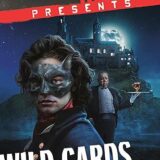
OBIR: Occasional Biased and Ignorant Reviews reflecting this reader’s opinion.

FUSION FRAGMENT MAGAZINE #24 – February 2025.
Publisher: Fusion Fragment, Ottawa, Ontario, Canada.
Editor: Cavan Terrill
Cover Art: by Abi Stevens
Lucinda’s Espinosa’s Twenty-Seventh Death – by M.R. Robinson
Premise:
A love affair with a serial killer is never a good idea, especially when the killer is utterly unique.
Review:
This particular affair makes the Stockholm syndrome (falling in love with the person holding you hostage) look simplistic. Even a normal love affair offers frequent opportunities for regret and self-incrimination unless mental agility and imagination are firmly in the grip of mature and intelligent self-discipline. I can say this with a straight face because it’s the kind of pep talk I used to give myself whenever recovering from a failed relationship. Downsizing the problem by insisting all I needed was a slightly sharper focus enabled me to blunder easily into my next affair. But this, I don’t think I could have handled this setup!
The story reads, at first, like a parody of cliché western plots, then casually widens its scope in a most unexpected way. Remarkably, it turns out to have a great deal to do with the science of physics, and even more remarkably, renders quantum mechanics up close and personal. Which is another way of saying this is one of the most original stories I’ve ever read. I prefer concept-driven fiction to mushy love stories (I mean, anybody can fall in love, so what’s the big deal?) but in this I case I can with 100% honesty say I love this love story.
This Great Rumble – by Kate Lechler
Premise:
The Egyptians used to worship cats. Maybe they knew something we’ve forgotten?
Review:
I love cats. I never pass one without at least saying hello. I own a cat, or to use the common definition of the arrangement, a cat owns me. We take comfort in each other’s presence.
She doesn’t trust anyone else, and come to think of it, neither do I. Well, that’s an exaggeration. Point is, in common with most types of pets, both “partners” let all guards down and relax. This may be the principal virtue of a pet, that they allow us to take off our masks and just be ourselves.
I don’t know about Rex, though. A large orange Tabby, a woman dissatisfied with her work and co-workers in equal measure adopts him as something to look forward to going home to at night. Her first indication he might be out of the ordinary is his meticulous dismantling of her computer mouse as if he was trying to figure out how it worked. Matters escalate from there.
I’m not sure what to make of this story. A charming fantasy about cats being even more extraordinary than we normally perceive, or perhaps a metaphor for a lonely life lived in the midst of a crowd of unsympathetic strangers. As if to imply we all need a Rex in our lives. Perhaps the most practical takeaway is simply that a vivid imagination is both a curse and a treasure. Then again, overthinking like crazy and digging deeper, there may be overtones of divinity in our ability to adapt as we see fit. Rex is ultimately presented as something of a religious figure. A role model, perhaps?
To sum up, the story may be a bit of a puzzle for me, but one that is intriguing and memorable, and therefore well worth reading.
Guiding Star of Mall Patroller 4U-012 – by Eric Schwitzgebel
Premise:
How do you liberate a robot?
Review:
Activists “kidnap” a mall robot in order to set it free. At first, I thought in terms of those people who go around stealing and killing pet animals on the grounds that all domesticated animals are “unnatural” and must be purged to please Mother Earth (you know who they are). I assumed 4u-012 would come to no good end. But the story isn’t as simple as the way my mind habitually works.
In fact, the story presents virtually all arguments for and against robot consciousness in a tour de force which proves logic can be used to justify anything. For example, in the case of arguing AI is strictly the result of programming, it is suggested that human thought is pretty much the same. This puts me in mind of Philip K. Dick’s famous talk “The Android and the Human” given first at the University of B.C. and then the following day at VCON #2 SF convention in Vancouver in February of 1972.
To quote from my own Weirds Did It! The Chronicles of B.C.S.F.A. Vol #1:
“Mike Horvat introduced Philip K. Dick for his keynote speech (not delivered at a banquet, for the banquet was cancelled, not enough interest). The basic idea in Dick’s talk was, instead of studying machines to gain insight into human behaviour, why not study humans to gain insight into machine behaviour? This in order to understand the difference between human and non-human in human behaviour. He argued that much human behaviour was truly non-human, that government already possessed the science of ‘inauthentic human activity,’ and that if totalitarianism is to be avoided:
‘The ethics most important for the survival of the true, human individual would be: cheat, lie, evade, fake it, be elsewhere, forge documents, build improved electronic gadgets in your garage that’ll outwit the gadgets used by the authorities.’
In other words, typical Dickian thinking. One gathers that, were he alive (he died March 2, 1982), he would be entranced by today’s computer hackers.”
I wrote the above in 1998. If Dick were alive today, he’d greatly enjoy this story. Not only that, I think he would identify with the robot and envy its fate. Self-aware AI is a hot topic these days (I greatly fear its coming) and I would argue this story is essential reading for anyone interested in authentic human/robot interaction and what it really means. I suspect Philip K. Dick would agree.
As Big as a Whale – by Avra Margarita
Premise:
Being a monomaniac astronomer focused on a single cosmic mystery has its perils.
Review:
This story, a surreal fantasy, is not for the literal minded. Put simply, an astronomer/alchemist is obsessed with the cosmic (as in swimming in the vacuum of space) whale which ate his first wife and child. He’s convinced it knows the secrets of the universe. If only he could decipher its whale-song. Worse, it constantly taunts him, peering in through his tower’s window and occasionally slapping it with his tail. Hard to say which is the most obsessed, the astronomer or the whale.
Dali being my favourite artist, I find it easy to accept the surreal in everything, often identifying it when it isn’t even present (according to people who know me). So, I have zero problem accepting the premise of this tale. A modern fairy tale, really. Appropriate in the era which spawned Elon Musk. I know people who love the man. I despise him. And yet, and yet… I can’t help admiring him for placing a sports car with a dummy astronaut behind the wheel in orbit around the sun. That has immense appeal for me. So, too, the concept of a cosmic whale. As presented, a beautiful image worthy of poetry.
I suppose the story is a metaphor covering scientific obsession, or to put it another way, an unreasonably fanatic search for knowledge. This can be both a good thing and a bad thing. For example, I’ve heard that scientists know how to construct a cobalt bomb. This is rather a pity, since apparently the lowest possible yield is enough to shatter our planet. Naturally, I hope this is merely some sort of modern myth. Like most people, I hate being wrong. Though, in this case, I think I would be fully justified.
Be that as it may, I think this story is a wonderfully entertaining glimpse into obsession. Oddly enough, spending part of my life as an accounts payable clerk in the construction industry somehow aids me in relating to the dilemma of the protagonist. Go figure.
To Impersonate a Celestial Body – by Yasmeen Amro
Premise:
To impersonate a celestial body is more hazardous than you might think.
Review:
Talk about surreal… in this story to impersonate a planet is to enable scientists to explore its resources merely by examining your body. So much responsibility! You have to remain in human form lest your full size, larger than the Earth, makes life unbearable for every living creature on the planet you grew up on. Best to accept your fate and cooperate 100%, but is that even possible?
This is one way to render the exploitation of a planet, the inevitable “rape” of a planet, comprehensible in personal emotional terms. Of course, from the point of view of hard science, we will eventually need to exploit other worlds since the easily accessible resources on Earth are finite. This will be crystal clear once it is cheaper to exploit the asteroid belt than to deep mine here on Earth.
Still, if planets, moons and asteroids have feelings, are we not being obtrusive, rude, and murderous? Yeah, but that’s not going to stop us. Sensitive morality and holistic ethics have never overridden necessity in our entire history.
To sum up, I’d say this story is meant to remind us of the pristine beauty of worlds beyond ours until they finally become our property to do with as we will. Really, it’s expressing a sense of loss over what we are currently doing to our home planet. Like all good science fiction, it is about the here and now. We are to be pitied. But no matter. The entire human race must live until we become extinct. Such is fate.
Note: And once again I lack the energy or the time to review the remaining stories. The culprit is my novel Shatter Dark. I am constantly going over and over its 75,000-word text editing and rewriting in a desperate attempt to make it as readable as possible before its publishing deadline. Just about everything else I do has suffered as a result. Apologies to the writers listed below.
Equilibrium – by Ryan Goderez
All the Pretty Starships Fly like This – by J.R. Dewitt
The Earthlight Bright Before Her – by Albert Chu
CONCLUSION:
The five stories I reviewed are innovative and highly interesting to anyone who loves science fiction. Every story is worth pondering. As always, the quality of fiction published in this magazine is quite high. Frankly, I consider Fusion Fragment Magazine a “must read.” (Which is why I feel so guilty not getting through the whole issue for this review.) But soon, soon, I will be able to reorder my writing priorities. I promise.
Check it out at: < Fusion Fragment #24 >










